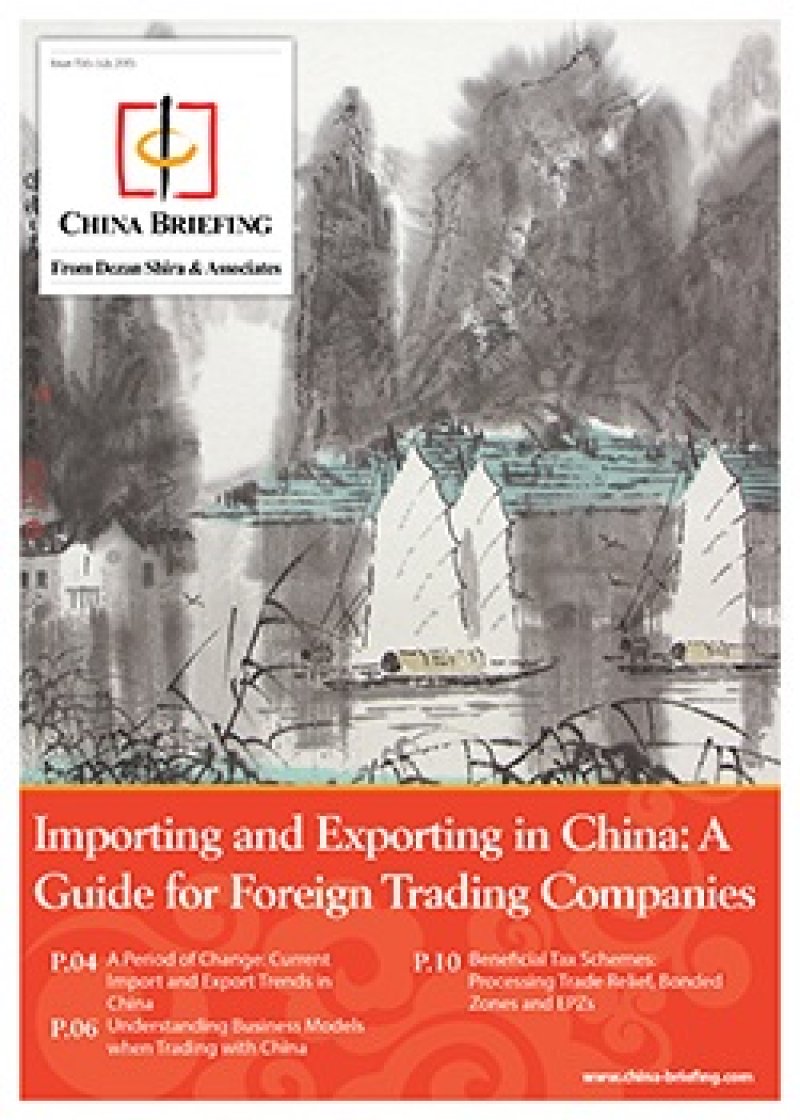Considerations when Investing in China’s Free Trade Zones
By Kyle Freeman
Senior Associate, International Business Advisory
Dezan Shira & Associates, Tianjin Office
In addition to the benefits of starting a business in China’s Free Trade Zones (FTZs), there are a number of other considerations that prospective investors should take into account when choosing their investment locations. It should be noted that while the majority of the FTZs are well connected by transport, they are not close to any sort of prominent commercial or residential areas. For example, the Nansha area of the Guangdong FTZ is connected to a major port and railway, but it is around an hour away from any major shopping or living areas in Guangzhou.
In other words, investments that sell wholesale to other areas of China, or export goods abroad, will be well served in all of the FTZs. However, businesses that require interaction with the general public will have to choose their location carefully for an FTZ investment to be worthwhile.
Intellectual Property Protection
Free Trade Zones have their own separate “three in one” intellectual property offices, covering patents, trademarks and copyright, which can resolve and enforce copyright disputes. The extent to which this will strengthen IP protection over the long term remains to be seen, but in the short term, it will cut down on time dealing with IP related government bureaucracy.
![]() RELATED: Business Advisory Services from Dezan Shira & Associates
RELATED: Business Advisory Services from Dezan Shira & Associates
Industrial Clusters
The economic efficiencies of being in a “cluster” are difficult to generalize, but potentially immense. Each area of the FTZs has its own stated aim for specific industries, and each sub-area of the FTZs has its own individual cluster of industries.
Cross Border Financing: HK and Taiwan
The Fujian and Guangdong FTZs have policies designed to increase economic integration with Hong Kong and Taiwan. One of the most promising areas involves cross border financing: parent companies based in Hong Kong with a subsidiary in these FTZs, for instance, can issue RMB denominated bonds in China, creating unique benefits for Hong Kong and Taiwan businesses.
Shanghai’s Visa Policies
Shanghai has sought to lessen restrictions for foreigners seeking visa or residence permits, particularly within its Free Trade Zone. Foreign qualified individuals can now receive employment offers by Shanghai FTZ companies via electronic invitation, and will be provided port visas upon arrival. Under the new regulations, companies based in the Shanghai FTZ may also arrange exit and entry proceedings directly with China’s Exit and Entry Bureau.
Customs and Value Added Tax Cuts
VAT is only applied once a product leaves an FTZ, and not to transactions that occur between companies in the FTZ itself. Moreover, goods that are imported into the four FTZs are not subject to customs duties, though they are subject to duties once they leave the FTZs. This could bring immense value to companies that are linked to a wider, global supply chain.
 This article is an excerpt from the January and February issue of China Briefing Magazine, titled “A Guide to China’s Free Trade Zones.” In this issue of China Briefing magazine, we examine China’s four Free Trade Zones and discuss the differences and strengths that exist in each of them. We begin by providing an introduction to the FTZs, and then take an in-depth look at the market access conditions, registration procedures and tax environments of each. Finally, we highlight some of the key considerations that foreign companies should be aware of when choosing an FTZ to invest in. This article is an excerpt from the January and February issue of China Briefing Magazine, titled “A Guide to China’s Free Trade Zones.” In this issue of China Briefing magazine, we examine China’s four Free Trade Zones and discuss the differences and strengths that exist in each of them. We begin by providing an introduction to the FTZs, and then take an in-depth look at the market access conditions, registration procedures and tax environments of each. Finally, we highlight some of the key considerations that foreign companies should be aware of when choosing an FTZ to invest in. |
![]()
 An Introduction to Doing Business in China 2015
An Introduction to Doing Business in China 2015
Doing Business in China 2015 is designed to introduce the fundamentals of investing in China. Compiled by the professionals at Dezan Shira & Associates, this comprehensive guide is ideal not only for businesses looking to enter the Chinese market, but also for companies that already have a presence here and want to keep up-to-date with the most recent and relevant policy changes.
 Selling, Sourcing and E-Commerce in China 2016 (First Edition)
Selling, Sourcing and E-Commerce in China 2016 (First Edition)
This guide, produced in collaboration with the experts at Dezan Shira & Associates, provides a comprehensive analysis of all these aspects of commerce in China. It discusses how foreign companies can best go about sourcing products from China; how foreign retailers can set up operations on the ground to sell directly to the country’s massive consumer class; and finally details how foreign enterprises can access China’s lucrative yet ostensibly complex e-commerce market.
Importing and Exporting in China: a Guide for Trading Companies
In this issue of China Briefing, we discuss the latest import and export trends in China, and analyze the ways in which a foreign company in China can properly prepare for the import/export process. With import taxes and duties adding a significant cost burden, we explain how this system works in China, and highlight some of the tax incentives that the Chinese government has put in place to help stimulate trade.
- Previous Article Emerging Trends for Venture Capital Activities in China’s Privatized Education
- Next Article Praktische Hilfestellung bei der CCC Zertifizierung und für das After Sales Geschäft – Teil 3










